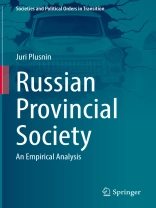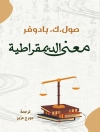This book presents a unique analysis of modern Russian provincial society. Based on detailed empirical evidence, it develops a theoretical model of Russian provincial society in the late 20th century and the early 21st century. The book explains how under the conditions of catastrophic changes, Russian provincial societies have undergone a structural transformation. It further sheds light on the transformation of the economic behavior of the population and households with regard to economic practices, crafts, and revived archaic forms of labor behavior.
Summarizing the extensive empirical evidence, the book puts forward the concept of complementarity of two social structures at the local level: a ground ‘soft communal’ structure and a ’tightening with an iron hoop’ estate state structure. Next, it discusses the stability and resistance of the local social structure to external political disturbances. Based on the presented analysis, the book introduces several independent criteria on the basis of which it establishes the typology of all empirically observed forms of societies. Subsequently, the book identifies six main types of Russian provincial societies. It explains how depending on the type, the different societies either adapt to political and economic changes in different ways, stay unchanged or transform their structure.
The book will appeal to students, scholars, and researchers of economics, political science, sociology, and anthropology, interested in a better understanding of transformation studies, population and household economics, provincial societies, as well as Russian societal structures.
Inhoudsopgave
Chapter 1. Introduction.- Chapter 2. Provincial Societies: Definitions and Conceptual Framework.- Chapter 3. Methodology.- Chapter 4. Typology.- Chapter 5. Local Territorial Organization.- Chapter 6. Local Economy.- Chapter 7. Archaic Economy: Wandering Workers and Scattered Manufactories.- Chapter 8. Crafts.- Chapter 9. Kinship and Neighborhood.- Chapter 10. Status and Authority.- Chapter 11. Conclusion.
Over de auteur
Juri Plusnin is a professor at the Faculty of Social Sciences at the National Research University – Higher School of Economics (HSE) in Moscow, Russia. He is the Deputy Head of the Laboratory for Local Administration at the HSE. Plusnin’s research combines a theoretical analysis of the deep foundations of social life with the results of field socio-anthropological observations of provincial life. In recent years, he has focused on studying the social structure of provincial society and the community social institutions that ensure its maintenance.












